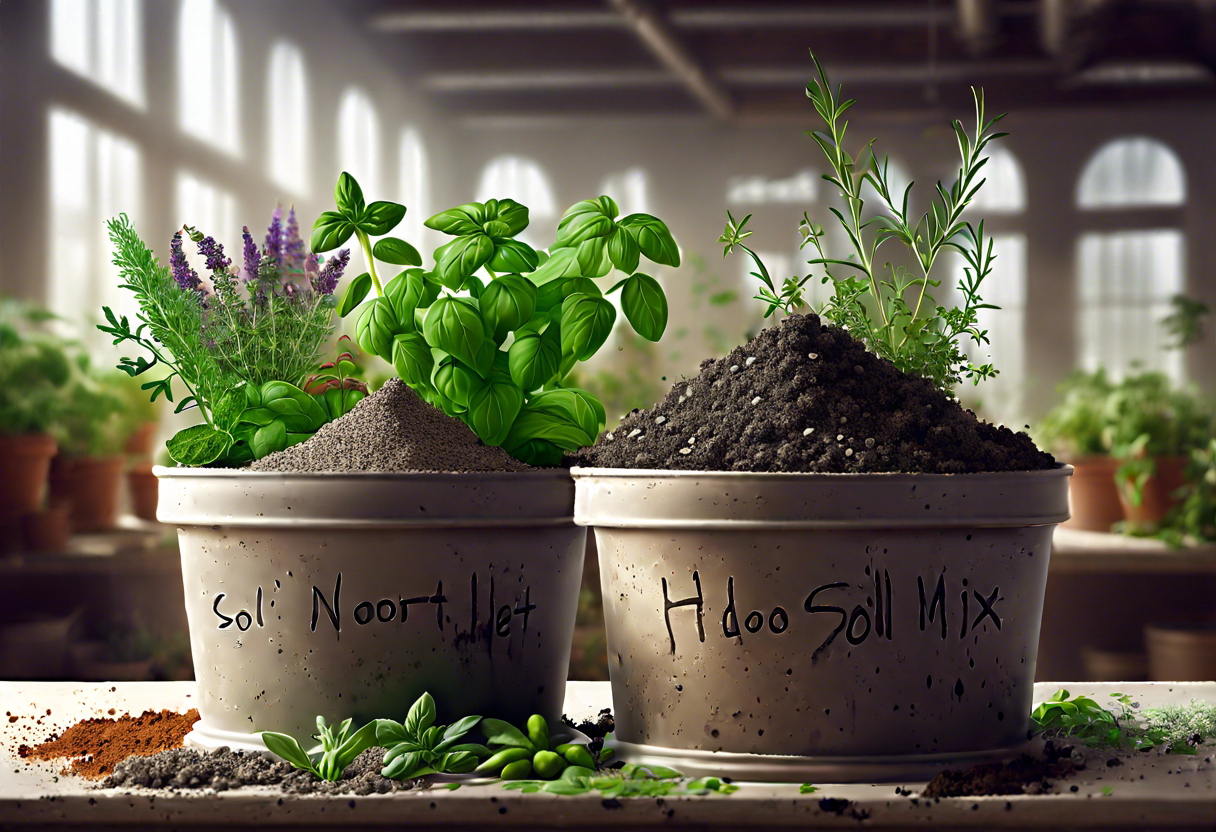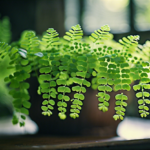Benefits of Using an Indoor Herb Soil Mix
When it comes to growing herbs indoors, having a high-quality soil mix is essential for the success of your plants. An indoor herb soil mix provides numerous benefits that can greatly enhance the growth and health of your herbs. Let’s explore some of the key advantages of using such a soil mix.
1. Nutrient Rich: An indoor herb soil mix is specially formulated to provide the necessary nutrients that herbs need to thrive. It usually contains a balanced blend of organic matter, compost, and minerals, ensuring that your herbs receive the essential elements for their growth.
2. Improved Drainage: Unlike regular garden soil, indoor herb soil mix offers improved drainage capabilities. Herbs prefer well-drained soil to prevent waterlogging, which can lead to root rot and other plant problems. A good soil mix allows excess water to drain away, preventing damage to the roots and ensuring optimum plant health.
3. Enhanced Moisture Retention: Indoor herb soil mixes are designed to retain the right amount of moisture for your plants. They strike a balance between holding enough water to keep the herbs hydrated without becoming overly saturated. This feature is especially crucial for indoor herb gardens, where the moisture levels can be harder to control compared to outdoor gardens.
4. pH Balance: Maintaining the correct pH level is crucial for the well-being of your herbs. Indoor herb soil mix is typically pH balanced, ensuring that your plants receive the optimal level for nutrient absorption and overall growth. This eliminates the guesswork of adjusting the soil pH manually, saving you time and effort.
5. Disease Prevention: Using an indoor herb soil mix minimizes the risk of plant diseases. These mixes are often sterilized, preventing harmful pathogens and fungi from infecting your herbs. Additionally, they may contain beneficial microorganisms that boost plant immunity and promote a healthy root system.
6. Convenience: Indoor herb soil mixes are convenient to use, saving you the hassle of sourcing and combining different materials to create your own mix. They come ready to use, removing the need for complex calculations or trial and error to achieve the optimal soil composition.
7. Optimal Growth: Ultimately, the use of an indoor herb soil mix results in optimal growth and productivity. With the right nutrients, moisture balance, and drainage, your herbs will thrive, producing an abundance of flavorful leaves that you can harvest and enjoy in your culinary creations.
Incorporating an indoor herb soil mix into your indoor herb garden offers a range of benefits, from providing essential nutrients to improving drainage and disease prevention. It is a convenient and effective way to ensure your herbs receive the ideal growing medium, leading to healthy and thriving plants that can be harvested and enjoyed throughout the year.
Essential Components of an Effective Indoor Herb Soil Mix
Creating an indoor herb garden can be a rewarding and convenient way to have fresh herbs at your fingertips all year round. One of the key factors in ensuring the success of your indoor herbs is the soil mix you use. An effective indoor herb soil mix provides the right balance of nutrients, drainage, and aeration to support healthy plant growth. Here are some essential components to consider when creating your own indoor herb soil mix.
1. Lightweight Medium: Indoor herb plants require a well-draining soil mix to prevent waterlogged roots. A lightweight medium like coconut coir, vermiculite, or perlite helps to improve soil structure and drainage. These materials also retain moisture, ensuring that the herbs have access to water as needed.
2. Organic Matter: organic matter into your indoor herb soil mix provides essential nutrients and helps retain moisture. Compost, worm castings, or well-rotted manure can be added to the soil mix. These organic amendments improve soil fertility and support the overall health of your herbs.
3. Balanced pH: Herbs, like most plants, thrive in soil with a slightly acidic to neutral pH range. Before creating your soil mix, test the pH of your ingredients. Adjusting the pH, if necessary, can be done by adding lime to raise the pH or sulphur to lower it. Maintaining a balanced pH helps the herbs to absorb nutrients effectively.
4. Nutrient-Rich Additives: Indoor herbs benefit from regular supplementation of nutrients due to the limited nutrient availability in container gardening. Adding slow-release organic fertilizers, such as fish meal or seaweed extract, to your soil mix can provide a steady supply of essential nutrients throughout the growing season.
5. Drainage Enhancers: Good drainage is crucial to prevent water accumulation and root rot in indoor herb gardens. Adding coarse sand or small pebbles to your soil mix can improve drainage by creating air pockets for excess water to escape. This ensures that the herbs’ roots remain healthy and avoid the risk of waterlogging.
6. Trace Minerals: Trace minerals like calcium, magnesium, and iron are essential for the overall growth and development of plants. Including amendments such as rock dust or kelp meal in your indoor herb soil mix can provide these trace minerals, ensuring that your herbs receive all the necessary micronutrients they need.
By ensuring your indoor herb soil mix includes these essential components, you are setting your herbs up for success. Remember to regularly monitor and adjust watering and fertilization to meet the specific needs of your herbs. With a well-prepared soil mix and proper care, you can enjoy a thriving indoor herb garden and elevate your culinary creations with the freshest flavors.
Step-by-Step Guide to Creating Your Own Indoor Herb Soil Mix
Creating a suitable soil mix is essential for the success of your indoor herb garden. While there are pre-made soils available in the market, making your own indoor herb soil mix gives you the flexibility to customize it according to the specific needs of your plants. Here is a step-by-step guide to help you create a perfect soil mix for your indoor herb garden:
Choose the Base
The first step in creating your indoor herb soil mix is to choose the right base. A good base for indoor herb soil mix should provide proper drainage and moisture retention. A common base is a high-quality potting soil that is specially formulated for indoor plants. This type of soil is lightweight, sterile, and usually contains a blend of organic matter, perlite, and vermiculite.
Add Organic Matter
To enhance the nutrient content of your soil mix, it’s important to add organic matter. Compost or well-rotted manure are excellent options. Organic matter improves soil structure, promotes healthy root development, and enhances overall plant growth. Add a generous amount of organic matter and mix it well with the base soil.
Incorporate Perlite or Vermiculite
To improve drainage and aeration, incorporate perlite or vermiculite into your indoor herb soil mix. These materials help prevent soil compaction, allow excess water to drain away, and promote oxygen movement to the roots. Add perlite or vermiculite in a ratio of 1:1 with the base soil, depending on the specific requirements of your herbs.
Consider pH Balance
Indoor herbs typically prefer a slightly acidic to neutral pH range. To ensure proper pH balance in your soil mix, consider adding lime or sulfur based on the pH test results of your base soil. This will help create an optimum environment for your herb plants to thrive.
Include Nutrient-Rich Amendments
While organic matter provides some essential nutrients, additional amendments can further enrich the soil mix. Consider incorporating slow-release organic fertilizers or a balanced granular fertilizer suitable for indoor herbs. These amendments will provide a steady supply of nutrients to your plants throughout their growing period.
Thoroughly Mix the Ingredients
Once you have added all the necessary components, thoroughly mix the ingredients to ensure they are evenly distributed. This will ensure that your herbs receive an equal supply of nutrients and maintain a uniform growing environment.
Test and Adjust
Before potting your herbs in the soil mix, it is advisable to perform a soil test to determine the nutrient levels and pH of your mix. This will help you make any necessary adjustments to meet the specific needs of the herbs you intend to grow.
By following this step-by-step guide, you can create a customized indoor herb soil mix that provides your plants with the optimal conditions for growth. Remember to monitor your herbs’ moisture needs, provide adequate sunlight, and enjoy the fresh and flavorful herbs right in your own home all year round!
Top Tips for Maintaining Healthy Soil in Indoor Herb Gardens
Creating a healthy and thriving indoor herb garden requires much more than just placing your plants in pots and watering them regularly. To ensure optimal growth and longevity, you need to pay special attention to the soil in which your herbs are planted. Here are some top tips for maintaining healthy soil in your indoor herb garden:
- Choose the Right Soil Mix: When it comes to indoor herb gardening, using the right soil mix is crucial. Look for a well-draining potting mix that is specifically formulated for container gardening. Avoid using garden soil, as it can be too dense and compact for indoor pots.
- Add Organic Matter: Organic matter, such as compost or aged manure, can provide essential nutrients to the soil and improve its overall structure. Mix in a small amount of organic matter into your potting mix before planting your herbs.
- Provide Adequate Drainage: Drainage is essential for preventing waterlogged soil, which can lead to root rot and other issues. Make sure your pots have drainage holes at the bottom and consider adding a layer of gravel or small rocks to the bottom of the pot to facilitate drainage.
- Water Correctly: Overwatering is a common mistake in indoor herb gardening. It’s essential to water your herbs correctly to avoid waterlogged soil. Allow the top inch of soil to dry out before watering again. Use a moisture meter or simply stick your finger into the soil to check for moisture levels.
- Maintain Proper Light Levels: Different herbs have varying light requirements, but most herbs thrive in bright, indirect light. Place your indoor herb garden near a sunny window, or consider using artificial grow lights to ensure your plants receive enough light for photosynthesis.
- Fertilize Regularly: Indoor herbs can benefit from regular fertilization to replenish nutrients in the soil. Choose a balanced, water-soluble fertilizer specifically formulated for herbs and follow the package instructions for application rates and frequency.
- Monitor Humidity: Adequate humidity levels are important for indoor herbs, as low humidity can cause leaf wilting and drooping. You can increase humidity by placing a tray filled with water near your herb garden, misting the leaves occasionally, or using a humidifier.
- Prune and Harvest Regularly: Regular pruning and harvesting not only keep your herbs in shape but also promote healthier growth. Pruning encourages bushier growth, and harvesting prevents the herbs from becoming overgrown.
By following these top tips for maintaining healthy soil in your indoor herb garden, you can create a favorable environment for your herbs to thrive. Remember that each herb may have specific care requirements, so it’s essential to research the individual needs of the herbs you are growing.
Exploring Different Soil Amendments to Enhance Indoor Herb Growth
When it comes to growing herbs indoors, the quality of your soil plays a crucial role in ensuring healthy growth and abundant harvests. While selecting the right indoor herb soil mix is important, incorporating different soil amendments can further enhance the growth and vitality of your herbs. These amendments can improve the soil structure, increase nutrient availability, and promote optimal drainage. In this article, we will explore various soil amendments that can help you achieve the best results in your indoor herb garden.
Compost
One of the most beneficial soil amendments for indoor herb gardens is compost. Compost is rich in organic matter, nutrients, and beneficial microorganisms. It improves soil fertility, promotes moisture retention, and enhances the soil’s ability to absorb and retain nutrients. compost into your indoor herb soil mix can create a nutrient-rich environment that supports healthy plant growth.
Perlite
Perlite is a lightweight volcanic rock that is often added to soil mixes to improve drainage and aeration. The porous nature of perlite helps prevent soil compaction and allows roots to breathe. By adding perlite to your indoor herb soil mix, you can ensure that excess water drains properly and the roots have access to oxygen, preventing root rot and fungal diseases.
Vermiculite
Vermiculite is another popular soil amendment that improves both water retention and aeration. It has the ability to absorb and retain water, providing a constant source of moisture for your herbs. Additionally, vermiculite aids in nutrient retention and releases essential minerals to the plants as needed. Including vermiculite in your indoor herb soil mix can help maintain optimal moisture levels and prevent water stress.
Coconut Coir
Coconut coir, also known as coco coir, is derived from the husks of coconuts. It is an excellent alternative to peat moss, as it is a sustainable and renewable resource. Coconut coir improves soil moisture retention, enhances aeration, and promotes the growth of beneficial microorganisms. It also has a neutral pH, which is beneficial for a wide range of herb varieties. Adding coconut coir to your indoor herb soil mix can provide a well-balanced growing medium for your herbs.
Worm Castings
Worm castings, also known as vermicompost, are the excrement of earthworms. They are rich in beneficial microorganisms, humus, and nutrients. Worm castings enhance soil structure, improve nutrient availability, and promote healthy root development. worm castings into your indoor herb soil mix can significantly benefit the overall health and growth of your herbs.
By exploring different soil amendments and incorporating them into your indoor herb soil mix, you can create an optimal growing environment for your herbs. Each amendment offers unique benefits that contribute to healthy plant growth, strong root development, and abundant harvests. Experiment with different combinations and ratios to find the perfect soil mix for your indoor herb garden and watch your herbs thrive.
Conclusion
Using an indoor herb soil mix offers numerous benefits for your indoor herb garden. The right combination of essential components such as potting soil, organic matter, perlite, and vermiculite ensures optimal growth and health for your herbs. By following a step-by-step guide to creating your own indoor herb soil mix, you can customize the blend to meet the specific needs of your herbs. Moreover, maintaining healthy soil is crucial for the long-term success of your indoor herb garden. Regularly monitoring moisture levels, providing adequate drainage, and avoiding overwatering are some of the key tips to ensure the well-being of your soil. Additionally, exploring different soil amendments, such as compost, worm castings, and coconut coir, can further enhance the growth and vibrancy of your indoor herbs.
One of the major benefits of using an indoor herb soil mix is its ability to provide the ideal growing environment for herbs. Unlike regular garden soil, an indoor herb soil mix is specifically formulated to meet the unique needs of herbs grown in containers. It provides excellent drainage while retaining enough moisture for the roots to thrive. This balance is crucial for preventing root rot and ensuring healthy growth.
The essential components of an effective indoor herb soil mix include potting soil, organic matter, perlite, and vermiculite. Potting soil serves as the base and provides the necessary nutrients for plant growth. Organic matter, such as compost or well-rotted manure, adds fertility and improves the soil’s structure. Perlite and vermiculite help with aeration and moisture retention, respectively.
Creating your own indoor herb soil mix is a simple and rewarding process. Start by combining equal parts potting soil and organic matter in a large container. Add a generous amount of perlite for aeration and vermiculite for moisture retention. Mix the components thoroughly to ensure an even blend. You can further customize the mix by adding additional organic matter or adjusting the ratios of the components based on the specific needs of your herbs.
Maintaining healthy soil in your indoor herb garden is essential for long-term success. Regularly monitor the moisture levels of the soil by checking the top inch with your finger. If the soil feels dry, it’s time to water your herbs. However, ensure that the containers have proper drainage holes to prevent water from accumulating at the bottom. Overwatering can lead to root rot and other issues.
Exploring different soil amendments can take your indoor herb garden to the next level. Compost, for example, adds nutrients and improves soil fertility. Worm castings provide a rich source of beneficial microorganisms that enhance plant growth. Coconut coir is an excellent alternative to peat moss, as it is sustainable and helps retain moisture.
Using an indoor herb soil mix offers several advantages for successful herb cultivation. Understanding the key components, creating a custom blend, and implementing effective maintenance techniques are crucial for maintaining healthy soil. By exploring various soil amendments, you can further enhance the growth and productivity of your indoor herb garden. With the right soil mix and care, you can enjoy the delightful flavors and aromas of fresh herbs all year round.


